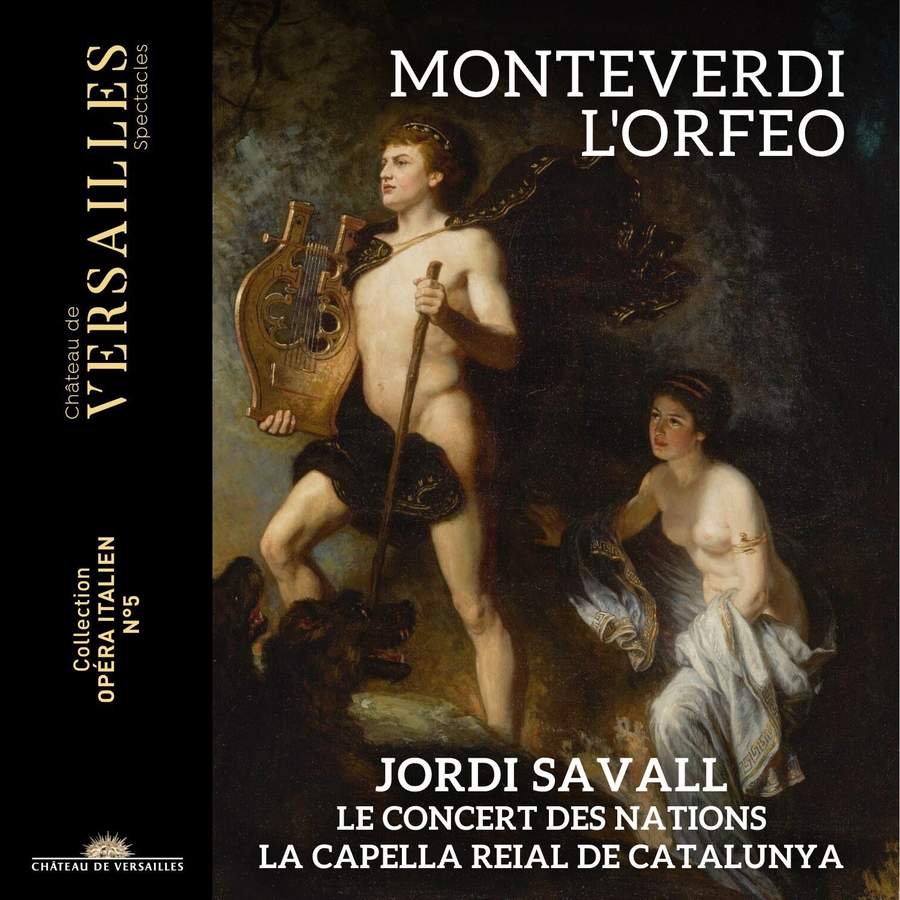MONTEVERDI Orfeo (Savall)
View record and artist detailsRecord and Artist Details
Composer or Director: Gabriel Diaz
Genre:
Opera
Label: Château de Versailles Spectacles
Magazine Review Date: 08/2023
Media Format: CD or Download
Media Runtime: 109
Mastering:
DDD
Catalogue Number: CVS080

Tracks:
| Composition | Artist Credit |
|---|---|
| (L')Orfeo |
Claudio Monteverdi, Composer
(La) Capella Reial de Catalunya (Le) Concert des Nations Alessandro Giangrande, Pastore III; Eco; Spirito I, Tenor Furio Zanasi, Apollo, Baritone Gabriel Diaz, Composer Jordi Savall, Conductor Lise Viricel, Ninfa, Soprano Luciana Mancini, Euridice; La Musica, Mezzo soprano Marc Mauillon, Orfeo, Baritone Marianne Beate Kielland, Speranza; Proserpina, Mezzo soprano Salvo Vitale, Plutone; Caronte, Bass Sara Mingardo, Messaggiera, Contralto Víctor Sordo, Pastore I; Spirito II, Tenor Yannis François, Pastore IV; Spirito III, Bass-baritone |
Author: Iain Fenlon
Ever since Nikolaus Harnoncourt’s and Jürgen Jürgens’s pathbreaking recordings of the 1970s, the challenges of performing Orfeo, arguably the most accessible of Monteverdi’s operas, have been explored by a procession of distinguished interpreters. Jordi Savall, who first entered the lists in 2002 with his DVD of a performance from the Gran Teatre del Liceu in Barcelona (Opus Arte, 2/03), now returns to Orfeo in a recording of the version given at the Opéra-Comique in Paris in 2021.
Little has changed in his conceptual approach to the work in the 20 years that separate the two. Confronted with the long list of instruments printed at the beginning of the score and the questions posed by some of the vague indications inside it, one of the first tasks of any performing edition is to settle the questions of ensemble size and instrumentation. This is Savall’s strong point, and his objective of ‘painting Monteverdi in the colours of the Mediterranean’ produces an expansive reading much in the manner of the Barcelona recording. The instrumental forces, made up of players drawn from his long-favoured ensembles La Capella Reial de Catalunya and Le Concert des Nations, here exquisitely melded to perfect synchronisation, is on the large side. Grouped around a central continuo ensemble consisting of harpsichords, a number of chamber organs including a regal, and a generous selection of plucked instruments (archlute, theorbo and guitar), these are underpinned by a richly sonorous sound in the lower registers. In the hands of Andrew Lawrence-King the harp is a substantial if at times over-indulgent presence. The luxuriant result, which still respects Monteverdi’s implied contrast between the bright colours of the pastoral episodes and the dark and sombre palette of the underworld, moves the music some distance away from the intimate sound world of the first Mantuan performance of 1607. It is paralleled by the full sound and deft singing of the chorus, by turns stately, incisive and crisp.
The soloists include a number of previous collaborators, including Furio Zanasi, who sang the title-role in the Barcelona performance and makes a convincing cameo appearance as Apollo. Sara Mingardo, whose account of La Messaggiera is one the high points of the earlier recording, turns in an emotionally more static reading, with the dramatic announcement itself comparatively understated. Marianne Beate Kielland’s Proserpina is decorous rather than seductive, and Salvo Vitale (who also sings Caronte) presents Plutone as quietly authoritative by way of response. But the real revelation is that of the baritone Marc Mauillon as Orfeo, whose understanding of the intimate fusion of words and music that lies at the heart of Monteverdi’s writing produces some beautifully parsed and rhetorically effective singing. ‘Possente spirto’, the emotional and literal centre of the opera, a ‘paragon of his ideal music for the theatre’ as Monteverdi described it, is delivered with a virtuoso command of the new highly expressive singing style, the ornamentation expertly absorbed into the texture of the voice. Yet for all its virtues this is not my recording of preference, which despite fierce competition continues to be the 1984 EMI version, largely for Nigel Rogers’s still unrivalled projection of the power of Orphic song.
Discover the world's largest classical music catalogue with Presto Music.

Gramophone Digital Club
- Digital Edition
- Digital Archive
- Reviews Database
- Full website access
From £8.75 / month
Subscribe
Gramophone Full Club
- Print Edition
- Digital Edition
- Digital Archive
- Reviews Database
- Full website access
From £11.00 / month
Subscribe
If you are a library, university or other organisation that would be interested in an institutional subscription to Gramophone please click here for further information.




